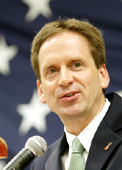|
|
|
Numerex Corp Secures Funding
Venture Business News |
2007/01/03 00:05
|
One of the leaders in wireless machine-to-machine or M2M solutions, Numerex Corp. (NASDAQ:NMRX) stated that they have entered into a $10 million financing agreement with the Laurus Master Fund, Ltd. According to the company the net proceeds from the transaction will be used primarily for strategic initiatives which may include joint ventures, co- marketing programs, and acquisition opportunities.
The financing is in the form of a four year US$10 million Convertible Note with a fixed interest rate of 9.5% and is secured by Numerex's assets. The company has also issued warrants to Laurus to purchase a total of 158,562 Numerex common shares at a price of $10.13.
NAMC |
|
|
|
|
|
|
Bill McCollum Sworn in as Florida's Attorney General
Attorneys in the News |
2007/01/02 20:17
|
Attorney General Bill McCollum was sworn into office today as Florida's 36th Attorney General. McCollum, a native Floridian, joined Governor Charlie Crist, Chief Financial Officer Alex Sink and Commissioner of Agriculture Charles Bronson at today's inaugural ceremony in Tallahassee, where the members of the new state Cabinet assumed the responsibilities of their offices. "I am humbled to serve the people of Florida as their Attorney General and will make the safety and security of our state and its citizens my top priority," said McCollum. "I look forward to the days and tasks ahead as we work together for the good of this state." McCollum, of Orlando, served on active duty in the U.S. Navy from 1969 to 1972, retiring as a Commander after 23 years of service in the Judge Advocate General's Corps. He later represented the people of Central Florida in the U.S. House of Representatives for 20 years, retiring in 2001. Today, as he begins his term as the state's newest Attorney General, McCollum pledged to continue to protect Florida's communities, families and children. One of his priorities will be the Attorney General's Child Predator CyberCrime Unit, which protects children from computer-facilitated sexual exploitation. The unit has made 33 arrests since its inception in October 2005. |
|
|
|
|
|
|
New U.N. secretary-general in early flap
Law Center |
2007/01/02 18:15
|
| New UN Secretary-General Ban Ki-moon said Tuesday that resolving the crisis in Darfur was "very high" on his agenda and would be one of his top priorities. Ban, whose tenure as secretary-general officially began Monday, said that he has already spoken to Jan Eliasson, former UN General Assembly President and current Special Representative for Sudan, and that he has a meeting with Eliasson scheduled for Wednesday to discuss the Darfur situation. Ban's predecessor Kofi Annan had in the final weeks of his own term pressed UN bodies - especially the new UN Human Rights Council - to focus more on Darfur. Ban, however, took a different approach, never mentioning the U.N. ban on the death penalty in all its international tribunals, and the right to life enshrined in the U.N. Charter. "Saddam Hussein was responsible for committing heinous crimes and unspeakable atrocities against Iraqi people and we should never forget victims of his crime," Ban said in response to a reporter's question about Saddam's execution Saturday for crimes against humanity. "The issue of capital punishment is for each and every member state to decide." His ambiguous answer put a question mark over the U.N.'s stance on the death penalty. It also gave the new chief an early taste of how tricky global issues are, and how every word can make a difference. |
|
|
|
|
|
|
Beermakers now allowed to give samples at bars
Breaking Legal News |
2007/01/02 18:14
|
Free beer tastings may be on tap at California bars and restaurants thanks to a new law lifting a ban on suds samples. The law, one of several taking effect with the new year, was backed by St. Louis-based Anheuser-Busch, which argued that it was unfair that the wine and distilled spirits industries were allowed to give out free samples of their wares. The beer company says it will conduct only small educational tastings about new beers. “It’s an opportunity for us to get consumers to sample some of our new products,†said Andrew Baldonado, western region vice president of government affairs for Anheuser-Busch.
“The winter’s bourbon cask ale is a seasonal beer that we’re doing. The best way to introduce those new products to consumers is to be able to have them sample them.†Some brewers, especially small ones, already offer tastings at their own facilities, as does Anheuser-Busch at its Fairfield plant. But previously, companies couldn’t offer free samples outside their own tasting rooms. The new law allows beer tastings at bars and restaurants. It limits the amount to no more than 8 ounces per person a day and requires the beer to be served in a glass. Tastings cannot last more than an hour and there are also annual limits on the number of tastings a single manufacturer, importer or wholesaler can offer at a particular establishment. |
|
|
|
|
|
|
Green to rejoin Green Bay law firm
Attorneys in the News |
2007/01/02 18:13
|
| U.S. Rep. Mark Green will rejoin the Green Bay law firm he worked for before entering politics in the early 1990s, according to Green's former campaign manager, Mark Graul. Graul said an announcement is expected to be made later this afternoon that Green, a Republican from Green Bay who lost his bid for governor in November against Democratic incumbent Jim Doyle, will return to Godfrey & Kahn, a Milwaukee-based law firm with offices in Green Bay, Appleton, Madison, Waukesha, Washington and China. Green worked for the firm for 11 years, beginning in 1989. The firm specializes in business law and corporate transactions, according to its Web site, but also serves individual clients in matters such as estate planning. Green will work with clients on administrative and regulatory legal matters and assist businesses in their needs in international markets, according to a news release. |
|
|
|
|
|
|
Protests continue in wake of Saddam hanging
International |
2007/01/02 15:11
|
| Sunnis demonstrated in the streets of Iraq Monday in continuing opposition to the Saturday execution of Saddam Hussein, which was captured on camera phone video taken at the scene. Most notably, Sunni protestors in Samarra stormed into a damaged Shiite Mosque bearing a photograph of Hussein and a fake coffin. At a prison in the northern Iraqi town of Mosul, news of Hussein's execution also prompted rioting by inmates, many believed to be Sunni Arabs. Prisoners clashed with guards after learning of the news during visiting hours Monday, leaving seven prison officials and three inmates injured. |
|
|
|
|
|
|
Italy urges global execution ban
International |
2007/01/02 14:10
|
Italian Prime Minister Romano Prodi said Tuesday that he would push the United Nations to adopt a universal ban on the death penalty after this weekend's execution of Saddam Hussein. Italy, which assumed a two-year non-permanent seat on the UN Security Council Monday, was one of 85 UN member states that in December joined together to urge the abolition of the death penalty and institute a moratorium on executions. Reuters has more. Hussein's execution has prompted criticism from rights groups and world leaders, both for its imposition of the death penalty and the circumstances surrounding Hussein's trial and hanging. Terry Davis, Secretary General of the Council of Europe, Europe's human rights watchdog, said in a statement posted on the COE website Tuesday: "The trial of Saddam Hussein was a missed opportunity in a country which does not have many opportunities. It was an opportunity for Iraq to join the civilised world. The former Iraqi dictator was a ruthless criminal who deserved to be punished, but it was wrong to kill him.... The death penalty is cruel and barbaric, and I call on the Iraqi authorities to abolish it. It is late, but not too late, for Iraq to join the great majority of civilised and democratic countries in the world who have already abolished the death penalty." |
|
|
|
|
|
|
Class action or a representative action is a form of lawsuit in which a large group of people collectively bring a claim to court and/or in which a class of defendants is being sued. This form of collective lawsuit originated in the United States and is still predominantly a U.S. phenomenon, at least the U.S. variant of it. In the United States federal courts, class actions are governed by Federal Rules of Civil Procedure Rule. Since 1938, many states have adopted rules similar to the FRCP. However, some states like California have civil procedure systems which deviate significantly from the federal rules; the California Codes provide for four separate types of class actions. As a result, there are two separate treatises devoted solely to the complex topic of California class actions. Some states, such as Virginia, do not provide for any class actions, while others, such as New York, limit the types of claims that may be brought as class actions. They can construct your law firm a brand new website and help you redesign your existing law firm site to secure your place in the internet. |
Law Firm Directory
|
|







